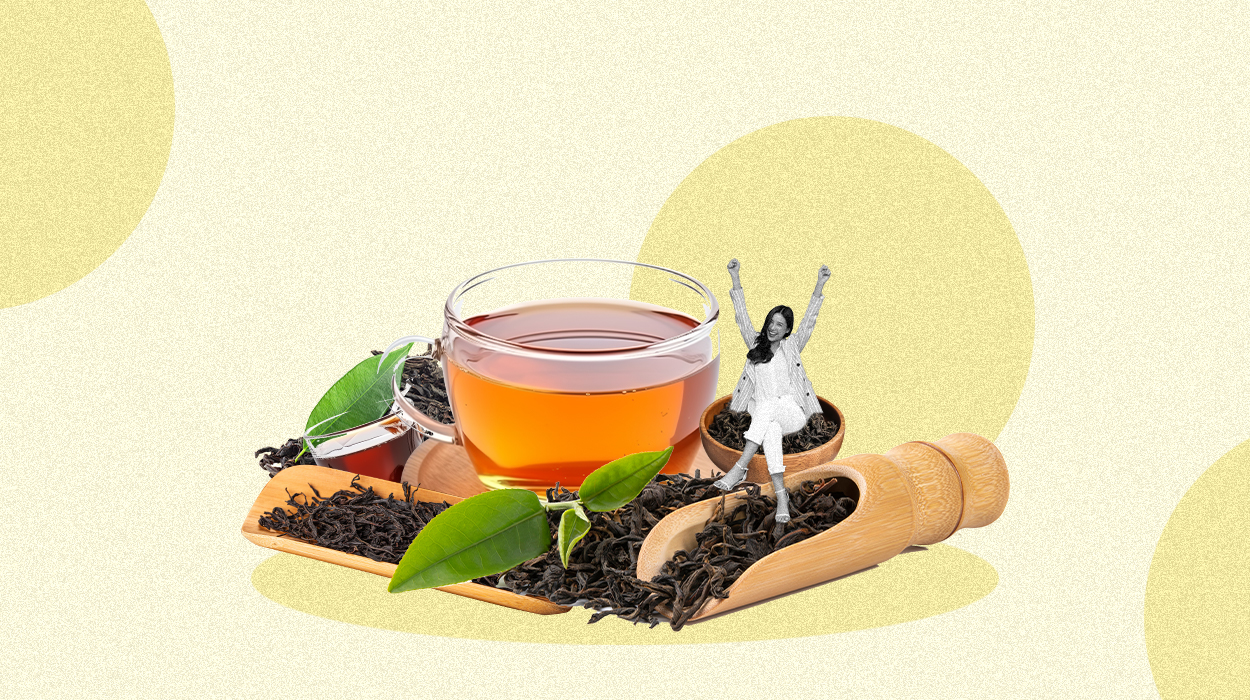Black tea has been enjoyed for centuries. It comes from the leaves of the Camellia sinensis plant and possesses a wealth of health-promoting properties. This dark cousin of green tea packs a punch of flavor and aroma. It also has a rich history and diverse preparations.
This article on black tea benefits will walk you through how drinking black tea can elevate your wellness routine and delight your tastebuds. It pairs well with many healthy snacks for weight loss.
So, grab a cup of freshly brewed tea and sip your way to better health!
Black Tea Benefits
- Protects against free radicals and oxidative stress.
- Lowers the risk of heart disease.
- Protects neurological health.
- Promotes beneficial gut bacteria.
- Aids in weight control.
- Strengthens immunity.
- Reduces risk of type 2 diabetes.
- Inhibits the risk of cavities and gum disease.
- May help lower the risk of ovarian, lung, and prostate cancer.
- Enhances mental alertness.
Benefits Of Black Tea

Black tea consumption appears to have many health benefits.[1] Some of the vital health benefits of regularly drinking black tea include:
Antioxidant Properties
The antioxidants in black tea help protect the body from free radical damage and oxidative stress. In addition, catechins, theaflavins, and thearubigins reduce chronic disease and the risk of stroke.
Improved Heart Health
Drinking black tea regularly may help protect your heart.[2] It lowers LDL cholesterol levels, reduces blood pressure, and enhances the function of your blood vessels. This makes black tea a potential weapon against cardiovascular disease and a compliment to the best high blood pressure supplements.
Cognitive Function
Black tea can improve mental alertness, focus, and cognitive function. You can thank the caffeine and L-theanine for supporting better brain health. Drinking black tea daily may also reduce the risk[3] of developing neurodegenerative diseases. What a tasty way to guard against Alzheimer’s and Parkinson’s!
Gut Health
Black tea contains compounds that promote the gut’s growth of “good” bacteria. Improved gut health[4] means a healthier digestive system. When wondering how to clean your gut, remember that promoting “good” bacteria is just as important as purging unwanted flora.
Weight Management
The combination of caffeine and catechins in black tea can help boost metabolism. An optimized metabolism is essential for weight management and both green and black teas have long been recognized to fight the risk factors for obesity.
Improved Immune System
Black tea contains antimicrobial properties that can help strengthen the immune system. As a result, it protects the body against common infections.
Reduced Risk Of Type 2 Diabetes
Drinking black tea appears to help lower the risk of developing type 2 diabetes. It does this by improving insulin sensitivity and blood sugar control.
Oral Health
The polyphenols in black tea can help inhibit the growth of harmful bacteria in the mouth. Getting rid of those extra bugs reduces the risk of cavities and gum disease.
Reduced Risk Of Certain Cancers
According to the National Cancer Institute, antioxidants in black tea may help reduce the risk of certain types of cancer. This is good news for people at high risk for ovarian, lung, and prostate cancers.
Stress Relief
The amino acid L-theanine in black tea promotes relaxation and helps counteract the effects of caffeine. Together, they’re great at battling stress.
Black tea can offer various health benefits, but drinking too much can cause problems. This is primarily due to its caffeine content. As with most things, moderation is key.
What Is Black Tea?

Black tea comes from the leaves of Camellia sinensis, which is also the source of other tea varieties like Green tea, White tea, and Oolong tea. The Chinese first made black tea centuries ago. Today, it is popular worldwide.
Black tea’s production process typically involves withering, rolling, oxidizing, and drying the tea leaves. This process gives black tea its rich aroma, dark color, and robust flavor. These steps can also vary, resulting in different types of black tea. Varieties such as Assam, Darjeeling, Ceylon, and Keemun each have unique flavor profiles.
What’s Unique About Black Tea?
The benefits of drinking black tea are many. It contains antioxidants called polyphenols, which decrease the risk[5] of chronic disease. Another group of antioxidants called flavonoids benefit heart health.
Vitamins, minerals, and other bioactive compounds have further fantastic benefits, such as lowering the risk of stroke or heart attack. The antioxidants in black tea also fight free radicals and cell damage.
Drinking black tea is safe for most people, but excessive intake may lead to side effects[6] of too much caffeine.
How To Drink Black Tea?
Consuming black tea daily lowers your risk of all kinds of health complications. But if you want the most out of your black tea intake, you’ll want to do more than just toss a tea bag into hot water.
Choose High-Quality Tea
Opt for a loose-leaf black tea from a reputable source to ensure better flavor and quality. High-quality, loose-leaf tea will have more nuanced flavors. It will also contain fewer impurities than lower-quality options.
Store Tea Properly
Keep black tea in an airtight container, away from light, moisture, and strong odors. Proper storage of dark tea preserves its freshness, aroma, and potency. These tips apply to other teas as well.
Use Fresh, Filtered Water
Start with fresh, cold, filtered water to brew your tea. Tap water may contain impurities that can affect your tea’s taste and overall quality.
Pay Attention To The Water Temperature
Black tea is best brewed at near-boiling temperatures (around 200-212°F or 93-100°C). Use a thermometer to ensure you have the correct water temperature. This empowers you to extract the full health-promoting compounds while preserving flavor.
Steep Tea The Proper Amount Of Time
You need to let black tea steep for 3-5 minutes, depending on your preference. Be sure to use a timer. Over-steeping can make tea bitter, while under-steeping may produce a weak flavor.
Avoid Adding Excess Sugar Or Sweeteners
You can enjoy black tea plain or with a small amount of honey, lemon, or milk. However, excessive sugar or sweeteners can increase calorie intake, so be mindful.
Drink In Moderation
Black tea does have caffeine. This means that excessive tea consumption may lead to unwanted side effects. Although black tea offers health benefits, you can have too much of a good thing. Three to four cups daily is a safe limit for most people.
Experiment With Different Varieties
Explore various types of black tea. Varieties such as Assam, Darjeeling, or Ceylon have their unique flavors. Maybe they’ll become your new favorites!
Conclusion
Black tea is a delicious and versatile beverage. It offers various health benefits, making it a great addition to a healthy lifestyle. Choose high-quality black tea. Brew it with care. Enjoy it in moderation. You can experience black tea’s many health benefits while enjoying some of the culinary world’s unique flavors.
Frequently Asked Questions
Black tea comes from the leaves of the Camellia sinensis plant. This plant also produces green tea, white tea, and oolong tea. Black tea leaves undergo a unique oxidation process. This results in the color and flavor characteristic of black tea.
You’ll probably have to drink at least two cups daily to notice a difference in your health. A maximum of three to four cups of black tea daily is a safe limit for most people. However, individual tolerance may vary. It’s essential to consider your caffeine sensitivity when consuming tea.
Yes, combining the caffeine and catechins in black tea can help boost metabolism. A faster metabolism can significantly aid in weight management and prevent obesity. Drinking tea can also help you stay hydrated without the sugar load of soda or juice.
Drinking black tea may improve cholesterol levels. It can also lower high blood pressure and enhance blood vessel function. All of this can help reduce the risk of developing heart disease.
The caffeine and L-theanine in black tea can improve mental alertness, focus, and function. It may even reduce your risk of brain diseases like Alzheimer’s and Parkinson’s.
Store black tea in an airtight container, away from light, moisture, and strong odors. This will preserve its freshness, aroma, and potency.
You can find polyphenols in both green and black tea. They can help reduce the harmful bacteria in the mouth. This means fewer cavities and less gum disease.
Use near-boiling water (200-212°F or 93-100°C). Steep black tea for 3-5 minutes, depending on your taste preference. Be sure to use a thermometer and timer. Overstepping or too much heat may result in a bitter taste. Under-steeping may produce a weak flavor.
 Expert's opinion
Expert's opinion
